
IEP 508: Nature in Romantic and European Thought
AWAYMAVE - The Distance Mode of MA in Values and the Environment at Lancaster University
Week 3. Romanticism
| Tutor Details | Biblio | Assessment | Resources | discussion |
I. Romanticism and the environment: an overview
Over the next two weeks we are going to look at the Romantic movement. Of course Romanticism was not just a philosophical movement but a broader political, cultural, artistic and intellectual movement which swept Europe in the late eighteenth and early nineteenth century and remained influential throughout much of the nineteenth century. At the most general level, Romanticism gave new value and importance to art, the imagination, emotions and individual sensibility, and to nature and human relationships with the natural world. However, Romanticism is not only important historically: it is now recognised that the Romantics had important and original philosophical positions in various areas of philosophy - aesthetics, the theory of knowledge, metaphysics, and most relevantly for us on the relationship between humanity and nature.
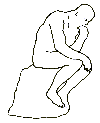 Short
Exercise:
Short
Exercise:
Pause here to think of some of the ideas that you associate with Romanticism or that you think of as being ‘Romantic’. Write these down – it will be helpful for you to be able to compare your list with the features of Romanticism that are discussed as we progress through this module.
The environmental movement has had a rather ambivalent attitude towards Romanticism. On the one hand, environmental thinkers often draw parallels between their own concerns and those of Romanticism. For example, the environmentalist idea of respect for nature is often linked to the theme of awe before nature which was powerfully articulated in much Romantic literature and poetry (Wordsworth’s poetry, for instance). More specifically, the idea that there is ‘intrinsic value’ in nature can also be related back to Romanticism. After all, as one scholar has commented – referring to German Romanticism in particular –
‘German Romanticism evinces a preoccupation with establishing in or through the subject's consciousness of the natural world a relation to value, furthermore, to value conceived as unconditioned or infinite, whence the infusion of religious qualities and ideas into the German romantic experience and theory of nature, all of this being undertaken, however, in full awareness of the antithetical modern scientific image of nature’ (Sebastian Gardner, ‘German Idealism’, in Proceedings of the Aristotelian Society Suppl. Vol. LXXVI (2002), p. 221).
As this quote illustrates, Romanticism tended to be strongly critical of modern science and to seek alternative ways of understanding and appreciating nature. However, other environmental thinkers are concerned about their association with Romanticism. For example, in his book Questioning Technology, Andrew Feenberg is worried that criticising technology makes someone into a ‘romantic technophobe’ (Routledge 1999, p. 153) and that Romanticism signals a ‘retreat from the technical sphere into art, religion, or nature’ (152) – a conservative retreat in the face of the modern world. For Feenberg (and many others) an effective environmentalist response to the problems of modernity must engage with the world rather than withdrawing from them, and so cannot be ‘romantic’, given that here Romanticism is associated negatively with obscurantism, mysticism, and a nostalgic flight into an imaginary past.
To get a clearer picture of the significance of Romanticism for environmental thought, we need to start by getting a richer understanding of Romanticism as a historical movement. But getting this understanding is difficult in itself, as Romanticism took widely differing forms in different countries and at different periods. In his book The Roots of Romanticism (London: Chatto and Windus, 1999), Isaiah Berlin catalogues some of the conflicting ways in which Romanticism has been defined (pp. 14-20). As he says, for example, Romanticism
‘is the confused teeming fullness and richness of life, Fülle des Lebens, inexhaustible multiplicity, turbulence, violence, conflict, chaos, but also it is peace, oneness with the great “I am”, harmony with the natural order, the music of the spheres, dissolution in the eternal all-containing spirit’ (p. 17).
Faced with this complexity, it has been suggested that we cannot meaningfully speak about Romanticism (in the singular) at all, but only of Romanticisms in the plural (where these Romanticisms do not share any common features but just form a loosely connected family).
Whatever the answer to this problem, we can clarify the relation of Romanticism to environmental movements by concentrating specifically on German Romanticism. German Romanticism is special in a number of ways which make it especially important to environmental thought:
- German Romanticism is especially concerned about certain negative aspects of modern life, including what it perceives as the downgrading in the status of nature by modern society and the modern domination of rationality
- It proposes some novel solutions to these problems, including the re-enchantment of nature through art, and the aestheticisation of culture
- Moreover, German Romanticism is highly philosophical, and so its approach to defining and trying to solve these problems is especially engaging.
Supplementary reading: on Romanticism and the problems
of defining it, see Isaiah Berlin, The Roots of Romanticism,
ch.1
II. German Romanticism: Its main concerns and characteristics
At the end of the eighteenth century, German intellectuals and writers became increasingly troubled by what they saw as an unacceptable series of conceptual oppositions constructed by the Enlightenment and embodied in modern social and political institutions. The most central of these oppositions are between humanity and nature, humanity and God, duty and desire, and self and others or society. Thus, Edward Craig says of the German Romantics:
‘Wherever they looked they found division and conflict in men’s minds and actions: the conception of God as creator of and eternal to nature, the finite opposed to the infinite; conscious, feeling man surrounded by inanimate, unfeeling objects; moral freedom against physical necessity; the battle between reason and sentiment; the desires of the individual versus the requirements of society; the tension between church and state; the friction between I and Thou...’ (Craig, The Mind of God and the Works of Man, p. 136).
In different ways, the German Romantics sought to;
(i) identify the source of these problems of division and opposition, and to
(ii) propose a solution.
Their diagnoses and solutions vary, but certain dominant themes can be identified.
(i) The source of the problems
The German Romantics generally thought that in a past age, the divisions characteristic of modernity had not existed: at this past time, humanity had lived in harmony with nature, nature was perceived as itself divine, and humans were integrated into their communities which educated them to spontaneously feel attracted to doing what is right. The period in question was that of the ancient Greek city-states. One of the most famous depictions of this original period of harmony and innocence is Friedrich Schiller’s poem ‘The Gods of Greece’:
A translation of the whole of Schiller’s poem (though
not a very good one!) is online at
http://eremia.republika.pl/godssch.html
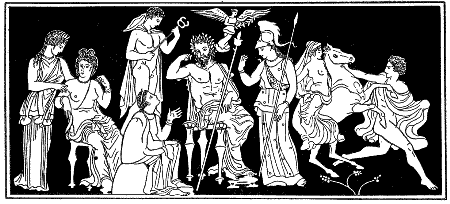 Schiller depicts a world where divinity was directly present in nature,
in the form of the naiads, deities, and demigods who immediately inhabited
natural places. Thus there was no split between nature and the divine:
divinity directly infused the natural world, for the ancient Greeks. Whether
this is a historically accurate account of the ancient Greek worldview
is open to question – but it remains a beautiful vision of a humanity
living in harmony with nature.
Schiller depicts a world where divinity was directly present in nature,
in the form of the naiads, deities, and demigods who immediately inhabited
natural places. Thus there was no split between nature and the divine:
divinity directly infused the natural world, for the ancient Greeks. Whether
this is a historically accurate account of the ancient Greek worldview
is open to question – but it remains a beautiful vision of a humanity
living in harmony with nature.
So what went wrong? The problem was seen, above all, to be the growth of Enlightenment and of the theoretical understanding of nature to which it aspires. This Enlightenment goal is problematic in several ways, according to the German Romantics:
1. It forces us to analyse everything into its components. But only when we see nature and natural things in their wholeness and integrity can we appreciate their divinity. As Goethe writes in Faust (I, lines 1935-38)
When scholars study a thing, they strive
To kill it first, if it’s alive;
Then they have the parts and they’ve lost the whole,
For the link that’s missing was the living soul.
(In England, Wordsworth explored the same theme:
Our meddling intellect
Mis-shapes the beauteous form of things.
We murder to dissect.)
2. The Enlightenment insists that we need to reflect upon everything instead of responding spontaneously to it, with emotion or passion.
3. The Enlightenment demands that we find a rational explanation for every phenomenon, and hence deprive nature of any magical, mysterious and transcendent qualities. As Max Weber later famously said of the rise of science in modernity, ‘principally there are no mysterious, incalculable forces that come into play, but rather … one can in principle, master all things by calculation. This means that the world is disenchanted’ (Weber, ‘Science as a Vocation’, in Essays in Sociology (Routledge, 1948), p. 139).
That is, Enlightenment science disenchants nature and it alienates us from nature by compelling us to assume a narrowly analytical, dispassionate, and calculating stance towards nature. The German Romantics sought to overcome these problems: ‘they hoped to restore the beauty, magic and mystery of nature in the aftermath of the ravages of science and technology’ (Frederick Beiser, entry on ‘German Romanticism’ in the Routledge Encyclopaedia of Philosophy)
(ii) What solutions are available to these problems?
Some of the German Romantics thought that these were problems inherent in the very goal of gaining theoretical understanding, a goal which itself inevitably becomes more and more important with the progress of civilisation. The only possible solution, then, could be to abandon the pursuit of theoretical knowledge, to become less reflective. Others took a different view. One of the most important of these others is Friedrich Schlegel whose ideas we will look at for the rest of this week. Schlegel thought that modernity not only led to the disenchantment of nature, but also enabled a new form of literature - Romantic literature - which could re-enchant nature. It wouldn't return us to the world of the Greeks, but it would invest nature with a new magic and mystery which would mark a distinctive kind of modern world which retains reverence for nature.
In these views, Schlegel shares with many German Romantics a concern to find a new social and cultural role for art. The crucial feature of German Romanticism is this idea that art provides the means by which we can recapture our lost unity with nature and - what is taken to be much the same - find meaning and mystery in nature again.
The notion that art could play this important role in uniting humanity and nature arose out of Kant’s theory of aesthetics. As we saw, according to Kant, in aesthetic judgement the faculties of understanding and sensibility work in harmony rather than the understanding dominating sensibility – as is, Kant holds, the case in theoretical judgements, which are the basis of the scientific account of the world. Thus aesthetic judgements overcome the understanding/feeling dichotomy that comes about when we adopt a theoretical, Enlightenment, viewpoint. Kant’s views on this seemed to prefigure a broader role for art and the aesthetic in overcoming the oppositions of the Enlightenment.
III. Friedrich Schlegel on the Disenchantment and Re-enchantment of Nature
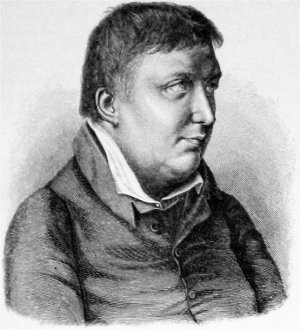 A
picture of Friedrich Schlegel (once he had become older - the writings
by him that we will look at were largely written in his 20s!).
A
picture of Friedrich Schlegel (once he had become older - the writings
by him that we will look at were largely written in his 20s!).
He was the dominant person behind a group of philosophers/thinkers who met in the German town of Jena (hence they are called the Jena Romantics, or Early Romantics).
They started a short-lived journal the Athenaeum which ran from 1798-1800.
You can find an introductory overview of Schlegel's life, work and thought here:http://www.kirjasto.sci.fi/schlegel.htm
Some of Schlegel's thoughts were written down as aphorisms - a selection of these is here:
http://www.memorablequotations.com/schlegel.htm
You might notice some similarities between Schlegel's style and that of Nietzsche.
This section gives an overview of Schlegel's ideas in relation to nature.
(1) Schlegel is very critical of modern culture for its artificiality - its domination by the understanding (i.e. rationality) which is reflective, analytic, and seeks explanations for everything. This criticism of modern culture is especially expressed in Schlegel's 1796 essay On the Study of Greek Poetry where he attacks modernity in the context of saying that modern literature lacks the unity, harmony and beauty of Greek works. Modern works are disunified, assymetrical, totally preoccupied with individuals and their peculiarities. These defects stem from the way the understanding reigns in modern culture.
According to Schlegel, the understanding (i) divides and analyses, it 'begins by dividing and dismembering the whole of nature'. (ii) It is dispassionate and reflective. (iii) it tries to explain everything as comprehensively as possible. (Likewise modern literature (i) focuses narrowly on isolated individuals (ii) relies on dispassionate rules and theories dictating how to produce literary works, and (iii) tries to take in everything, to bring everything within the scope of understanding - losing any coherent shape in the process [think e.g. of those massive 18th-century novels like Clarissa, Tom Jones.) Insofar as we take this attitude of 'understanding' towards nature, our attitude to it will be disenchanted. We will not respond to nature emotionally but just in a narrowly analytical way. Insofar as modern literature reflects the understanding attitude, it will disenchant nature as well - stripping it of any meaning to which we might respond passionately.
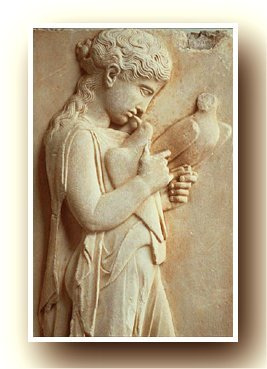 There
is a contrast throughout between modernity and the world of the ancient
Greeks. For them, Schlegel suggests, nature was enchanted - i.e. they
experienced it as the location of gods, nymphs, heroes. They responded
to nature emotionally and saw it as having spiritual meaning. This is
the attitude we have lost.
There
is a contrast throughout between modernity and the world of the ancient
Greeks. For them, Schlegel suggests, nature was enchanted - i.e. they
experienced it as the location of gods, nymphs, heroes. They responded
to nature emotionally and saw it as having spiritual meaning. This is
the attitude we have lost.
(2) In Schlegel's subsequent writings (the Critical Fragments, Athenaeum Fragments, and Dialogue on Poetry) he suggested that modern literature was not all bad after all. Rather, it had an inherent tendency to be romantic. Not all modern works are romantic, but if they realise their essence as modern works then they will be romantic. Romantic literature though has a potential to re-enchant nature. Several key features of romantic literature allow it to do this: (i) romantic literature is 'universal' - it tries to include all genres, subject matters, and to unify them in a single work. They're too diverse though to be unified. So romantic literature is 'progressive', it strives for unity, but never achieves it and always remains fragmentary. (ii) romantic literature is ironic. Any attempt to grasp the meaning of the parts of the work -the events depicted - as a whole, can itself only be partial, giving a limited perspective on this whole. Irony arises insofar as the romantic author realises that he can only be partial and cannot understand the whole. Thus as Oskar Walzel explains Schlegel's views:
'The romanticist was fully aware of the unbridgeable antithesis between his metaphysical deamdns and their fulfilment ... there remained between the infinite and every attempt to put it into words an insuperable gap. [In irony] the human spirit becomes aware of its inadequacy and with wise self-limitation offers its pronouncements in a way which in itself already admits this inadequacy' (German Romanticism, p. 43).
(iii) because romantic literature aims for a meaning which it never grasps, it sets up that meaning as something ineffable, transcendent, and mysterious - it gives us what Schlegel calls a 'sense of the infinite'. This makes the events described unfamiliar, as Schlegel's friend Novalis famously writes:
‘By giving what is commonplace an exalted meaning, what is ordinary a mysterious aspect, what is familiar the impressiveness of the unfamiliar, to the finite an appearance of infinity; thus I romanticise it’ (Novalis, Poeticism 1798)
How does this bear on nature? Insofar as romantic literature deals with nature, it will depict natural phenomena as having mysterious, ineffable meaning. (You could think here about what examples of this come to mind from literature - it needn't be literature that you'd necessarily think of as romantic).
Importantly, the re-enchantment of nature which Schlegel anticipates from romantic literature is distinctively modern. The aim isn't to go back to the Greeks who found familiar spiritual meanings in nature. Rather we will come to see natural phenomena as pointing to a meaning that lies beyond them, unknowable. Moreover, this re-enchantment is modern in that it results from the heightened rationality which for Schlegel is typical of modernity.
(i) Reflectiveness is necessary for irony: reflectiveness allows the author to draw back and recognise s/he has not grasped the infinite, cannot understand the meaning of nature.
(ii) Romantic literature reflects the desire to explain everything, to incorporate everything in a single work.
(iii) Analysis is necessary so that romantic literature will focus on details so that they profilerate out of control and resist complete comprehension. So just those features of modern rationality which Schlegel thought disenchanted nature also enable the kind of literature which can re-enchant nature.
Schlegel wants a culture which will re-enchant nature, which will be organised around giving a central role to romantic literature. But this isn't a retreat from modernity. Modernity is opposed to itself - though it dismembers nature, it gives rise to the abilities which can bring about a new form of literature that re-members nature. Romanticism urges us to realise this aspect of modernity at the expense of its 'dismembering' aspect. (Though we might wonder whether this is possible... whether we have to take the bad with the good, so that Schlegel's programme for cultural transformation could never be realised.)
With this overview of Schlegel's ideas in mind we can turn to a particular text.
IV. Dialogue on Poetry (1800)
Schlegel's most systematic statement of his views on literature is in his Dialogue on Poetry. (By 'poetry' he doesn't mean what we usually mean but rather literature as a whole. E.g. a novel counts as a piece of poetry for him. When he says 'poetry', he should be understood as just meaning 'literature'). This does not say that much about nature, but you can see that the question of humanity's relationship with nature is constantly in the background.
Please first read the text, which is in the course reader. The next section of this page gives an overview of what is happening in the text. Then there are some questions which you could work through or send your answers, or other questions, to the discussion site.
1. 'Epochs of Literature'
Schlegel begins by discussing different phases in the history of literature. He first talks about ancient Greek poetry and says that it continues to provide the model, the standard of beauty, which all subsequent literature must aspire to. After a rather negative phase with the Romans and then the disappearance of literature in favour of religion (during the 'dark ages'), poetry is reborn with Dante, who Schlegel thinks of as the first 'romantic' poet. Dante has the idea of producing 'a great work of ordered structure ... concentrat[ing] in one centre ... and in one immense poem' the highly disparate themes of nation, church, empire, nature, and the divine. (p. 90) Throughout, Dante's work is 'true to fact and truthful in the realm of the visible and full of secret meaning and relation to the invisible' (90). What this means is that because Dante tries to describe so many things, he cannot find any coherent meaning in them and he creates a sense of this meaning as something that lies beyond us and casts an aura of mystery over everything he describes.
Schlegel then argues poetry declined again because philosophy became more and more developed instead. He also stresses the late-18th century German studies of the classical world which began to examine Greek art and culture on its own terms and to recognise the beauty of Greek art. Simultaneously philosophy became more and more aware of the role of imagination and of human freedom to imagine. (p. 95) Thus German culture is ready for the idea that we can create the beauty of Greek art through the freedom of our imaginations.
2. 'Talk on Mythology'
(this is the key section of the Dialogue)
Modern poets must create 'magic', but in doing so they all have to start from scratch. They lack the shared mythology which all the ancients had (p. 96).
The old mythology came from the imagination, but it also 'imitated' what was 'most immediate and vital in the sensuous world'. This is the mythology of various gods and goddesses, heroes, and semi-divine beings like nymphs and fauns. It was an imaginative view of nature which found spiritual meaning in it. But though imaginative the Greeks saw this meaning as really contained within nature: they thought that e.g. particular places really were the homes or sites of various divine beings.
The new mythology on the other hand has to arise artificially, and 'from the innermost depths of the spirit' (p.97). This mythology is therefore based on idealism, Schlegel says. What does he mean by 'idealism'? - 'Idealism' in German philosophy at this time meant the view that human beings are active in making sense of their world and that they are free to make sense of the world in various ways. Thus, 'idealism' here means that human beings must freely imbue nature with meaning through a new kind of literature. How do they do this?
Schlegel says that 'it is the nature of spirit to determine itself and in perennial alteration to expand and return to itself'. This is a reference back to his theory of romantic irony. The spirit (i.e. each one of us, as a free being) first 'expands' in trying to grasp a meaning within disparate events, then 'returns to itself' recognising it has only produced another partial fragment. The cycle then begins again (as we've seen above). This process produces the sense of an infinite meaning which is beyond us, the feeling of a mysterious aura pervading all events.
Schlegel connects this process to what is going in contemporary physics (i.e. science). At his time, scientists were discovering electricity, chemical processes, and magnetism. Because of this, Schlegel claims that scientists are also trying to discover hidden connections in nature - but since they didn't (yet) have an adequate theory of these connections, they remained beyond comprehension and mysterious. Hence contemporary science is poetic - it also infuses nature with mystery. There is therefore a convergence between the 'realism' of science and the 'idealism' of romantic poetry.
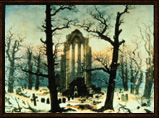
The new romantic poetry, together with physics, will give rise to what Schlegel calls a new mythology which is 'the hieroglyphic expression of surrounding nature in this transfigured form of imagination and love' (p. 99). The mythology construes nature as a hieroglyph, i.e. a system of signs that point to an indecipherable meaning beyond them. Thus nature is 'transfigured' - made meaningful - by imagination. This is a new mythology because, unlike the ancient one, it finds the meaning of nature ungraspable. For the Greeks it was quite transparent that Apollo spoke through the oracle at Delphi. But for the moderns the meaning of nature cannot be grasped. It does have a meaning, but we can't reach it.
3. 'Letter about the novel'
Schlegel goes back to a different definition of romanticism as that which 'presents a sentimental theme in a fantastic form' (p. 106).
He also repeats his idea of mystery, saying that the various events, things, people depicted in a romantic poem give only 'a hint of something higher, the infinite, [they become] a hieroglyph of the ... sacred fullness of a life of creative nature' (p. 107). So insofar as a romantic work depicts nature, it makes nature sacred, full of secret life.
The section is generally concerned with the possibilities for the novel. Schlegel sees this as the key romantic art-form (cf. his broad meaning of 'poetry'). He is exploring some ways in which this is so. His discussion here therefore doesn't add that much to understanding his views on nature, although it does help fill in an overall sense of his ideas.
Some questions on Schlegel:
(1) What do you think Schlegel's ideas amount to in practice? What does it mean for literature to portray nature as a 'hieroglyph' of an underlying meaning? What are some literary examples of this?
(2) And would this re-enchantment of nature be of any environmental importance? After all, if modern rationality disenchants nature and we need modern rationality to get romantic literature, then how much could it really change our way of life?
More generally: what's attractive to you in Schlegel, if anything? Or unattractive?
How coherent do you find his ideas?
For further reading on German Romanticism and Friedrich Schlegel, please see the bibliography page.
Web notes by Alison Stone updated March 2005
| Tutor Details | Biblio | Assessment | Resources | discussion|